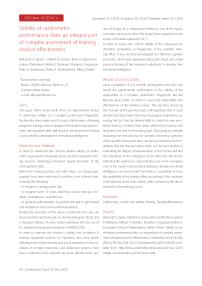Validity of cardiometric performance data: an integral part of complex assessment of training session effectiveness
Автор: Ognev Aleksandr S., Zernov Vladimir А., Likhacheva Elvira V., Nikolaeva Lyubov P., Rudenko Mikhail Y., Kagonyan Rosalina S., Kozintseva Polina А., Maslennikova Polina А., Mizin Nikita V.
Журнал: Cardiometry @cardiometry
Рубрика: Original research
Статья в выпуске: 14, 2019 года.
Бесплатный доступ
Aims The paper offers some results from our experimental studies to determine validity of a complex performance fingerprint: the Baevsky stress index used to assess effectiveness of training programs: training sessions targeted at formation of phsychosomatic self-regulation skills and visual & verbal practical training course aimed at development of emotional intelligence. Materials and methods In order to determine the criterion-related validity of cardiometric assessments of training results, we have organized training sessions addressing scheduled staged formation of the self-regulation skills. Before the training sessions and after them, our training participants have been instructed to perform a set of three tasks, covering the following: - to imagine a calming video clip; - to imagine some TV news reporting various dramatic incidents, emergencies, calamities etc. - to generate self-relaxation, to perform the task to get relaxed and initiated or induced an emotional balance...
Cardiometry, cardiocode, validity, training, training effectiveness
Короткий адрес: https://sciup.org/148308872
IDR: 148308872 | DOI: 10.12710/cardiometry.2019.14.96100
Список литературы Validity of cardiometric performance data: an integral part of complex assessment of training session effectiveness
- Burlachuk LF. Dictionary on psychodiagnostics. SPb.: Piter, 2007. 688 p. [in Russian]
- Kovaleva AV, Panova EN, Gorbacheva AK. Analysis of heart rate variability and the possibility of its use in psychology and physiology. Modern foreign psychology. 2013;1:35-50. [in Russian]
- Likhacheva EV, Ognev AS. On the possibility of using an eytreker for instrumental diagnostics of subject personality characteristics. International Journal of Applied and Basic Research. 2015;8-2:375-7. [in Russian]
- Ognev AS. Subject genetic approach to psychological self-regulation of personality. Moscow, 2009. [in Russian]
- Ognev AS, Venusina OG, Yakovlev VA. Using instrumental psychodiagnostics for evaluating information content. Vestnik MGGU: Pedagogy and Psychology. 2012;4:103-12. [in Russian]
- Ognev AS., Likhacheva EV. Validity of an eyetracker as a tool for psychodiagnostics. Successes in modern science. 2015;1-8:176-80. [in Russian] PubMed: 24124361
- Ognev AS, Likhacheva EV. On the possibility of using an eytreker for instrumental diagnostics of subject personality characteristics. International Journal of Applied and Basic Research. 2015;8-1:176-80. [in Russian] PubMed: 23719411
- Ognev AS, Likhacheva EV. The practice of introducing a positive-oriented subject of suppression into the higher education system. Psychology. Journal of Higher School of Economics. 2014;11(2):51-67. [in Russian] PubMed: 23593852
- Ognev AS, Petrovsky VA, Likhacheva EV. Oculometric manifestations of unconscious visual judgments. Bulletin of the Russian New University. Series: Man in the modern world. 2018;4:3-9. [in Russian] DOI: 10.25586/RNU.V925X.18.04.P.003
- Ognev AS, Petrovsky VA, Likhacheva EV. Oculometric manifestations of the psychological attitudes of the respondents in relation to the perception of visual content. Bulletin of the Russian New University. Series: Man in the modern world. 2018;2:41-8. [in Russian] DOI: 10.25586/RNU.V925X.18.02.P.041
- Ognev AS, Fan C, Likhacheva EV, et al. Prospects for the use of modern portable eytreker. In the collection: Human capital in the format of the digital economy. International Scientific Conference dedicated to the 90th anniversary of S.P. Kapitza: a collection of reports. 2018. P.41-48. [in Russian] DOI: 10.25586/RNU.CONF.18.02.P.349
- Ognev AS, Frolov YI. The possibilities of applying the method of a systematically-phased formation for teaching autogenic training. Bulletin of Moscow University. Series 14: Psychology. 1992;4:60-6.
- Romanova ES. Psychodiagnostics. SPb.: Piter, 2009. 400 p.
- Rudenko MY, Voronova OK, Zernov VA, et al. New opportunities for diagnostics of hemodynamics on the basis of phase analysis of the heart cycle. In: Cardiology -2008. Materials of the 10th All-Russian Scientific and Educational Forum. 2008. p. 19.
- Fan C, Likhacheva EV, Ognev AS. The use of cognitive induction in oculometric psychodiagnostics. International Journal of Applied and Basic Research. 2018;5-2:427-431. PubMed: 35310952
- Fan C, Ognev AS, Petrovsky VA, et al. Experimental confirmation of the phenomenon of neurovisual programming. Humanitarian Scientific Bulletin. 2017;5. P. 29-37. [in Russian] DOI: 10.5281/zenodo.2525382
- Tukaev RD, Antipova OS. Heart rate variability in hypnosis and hypnotherapy studies: possibilities and perspectives of scientific and clinical use. Social and Clinical Psychiatry. 2007;17(3):82-8.
- Ognev AS, Likacheva EV, Rzakov KA. Hardiness and purposes in life of modern Russian students. MIDDLE EAST JOURNAL OF SCIENTIFIC RESEARCH. 2013;14(6) 795-798 DOI: 10.5829/idosi.mejsr.2013.14.6.2138 PubMed: 20444330
- Rudenko M, Voronova O, Zernov V, et al. Theoretical principles of Cardiometry. Cardiometry. 2012;1:7-23.
- Rudenko MY, Zernov VA, Mamberger K, Rudenko SM. Heart and aortic baroreceptors: operation in providing hemodynamic processes in cardiovascular system. Cardiometry. 2013;3:31-44.


